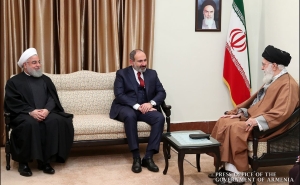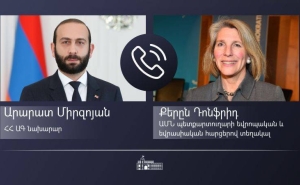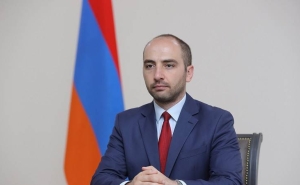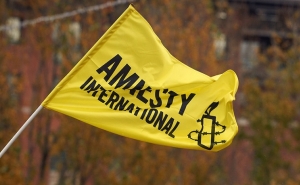MFA of Artsakh: John Bolton’s Expectations For The Azerbaijan-Karabakh Conflict Settlement Are Not Realistic
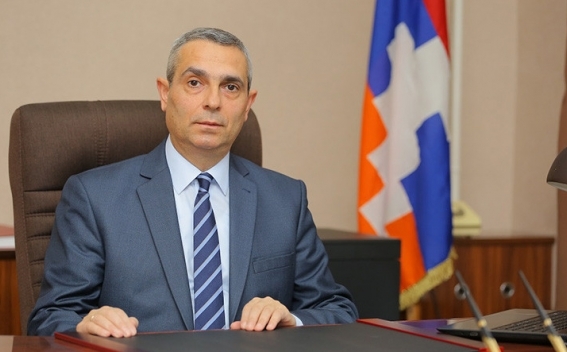
John Bolton’s expectations for the Azerbaijan-Karabakh conflict settlement are not realistic for various reasons, said Minister of Foreign Affairs of the Republic of Artsakh Masis Mayilian in the interview to the "Azat Artsakh" republican newspaper. You can find the full text of the interview below.
- Mr. Mayilian, on the background of the latest developments around the Azerbaijan-Karabakh conflict, in particular, the scandalous statement by the outgoing U.S. Ambassador to Armenia, you have reconfirmed the position of the Republic of Artsakh in the Karabakh peace process, stating that the Madrid Principles are outdated and cannot serve as a basis for the negotiation process. You have also stressed the importance of working with the mediators so that they do not use outdated approaches to the settlement. Did you express this viewpoint to the mediators?
- At the meeting with the OSCE Minsk Group Co-Chairpersons, we expressed our position on the need to restore the trilateral format of the negotiation process with the full-fledged participation of Artsakh and to revise some approaches to the negotiation process. An exchange of views took place, during which we stressed that our stance proceeds from the interests of promoting the settlement process, which would give a new impetus to the negotiations.
As to the statement by the U.S. diplomat, Richard Mills, I should note that the Azerbaijan-Karabakh conflict is not territorial. And it is not accidental that, according to Mills himself, the Armenian society does not accept any prospect related to territorial concessions.
Over the years, I have had the opportunity to brief various international experts and diplomats on why this conflict is not a territorial dispute. In particular, the issue is that in 1988, when the new stage of the conflict began, the territory around the former NKAO, even one of the NKAO districts, was under the control of Azerbaijanis. That is to say that despite the fact that these territories were controlled by Azerbaijanis, however, there did exist a conflict. Therefore, it is illogical to believe that a territorial concession from Artsakh can resolve the conflict.
All this indicates that seeking for the possibilities to resolve the conflict based on territorial concessions has no prospect and does not reflect the essence of the conflict.
As the President of the Republic of Artsakh has repeatedly stated, the basis for resolving the conflict should be the right of the people of Artsakh to a free and safe life in its homeland.
- Official Stepanakert keeps presenting an unchanged position to the international community, i.e. restoration of the full-fledged negotiation format with Artsakh's participation in all the stages of the conflict settlement process. We would like to draw your attention to the statement voiced by John Bolton, the National Security Adviser to the U.S. President in Yerevan, according to which, following the December parliamentary elections in Armenia, Nikol Pashinyan will, most likely, have a strong mandate, which will allow to take decisive steps in some areas, including the Karabakh conflict settlement. How would you comment on the statement by the President's Adviser?
- The positions of the Republic of Artsakh and the Republic of Armenia on the settlement are clear. For many years, the authorities of the Republic of Artsakh have consistently stressed the need to restore the trilateral format of the negotiations, with direct and full participation of the Republic of Artsakh in all the stages, which is crucial in facilitating a peaceful settlement and ensuring the effectiveness of the process. The settlement, in turn, must be based on the recognition of the fact that the people of Artsakh have exercised their right to self-determination. In this regard, I consider it necessary to confirm the willingness of the authorities of Artsakh to de jure assume their share responsibility for ensuring stability and peace in the region.
Acting Prime Minister of the Republic of Armenia Nikol Pashinyan also stated the necessity to return Artsakh to the negotiation table, which is also enshrined in the RA Government program.
As to John Bolton’s expectations for the Azerbaijan-Karabakh conflict settlement, they are not realistic, for various reasons.
- The relations between the two Armenian states and our neighboring and friendly country, Iran, have always been balanced. In the context of the Western sanctions imposed on Iran, the positions of the South Caucasus Republics may be different in terms of the prospect of cooperation with that country. Is there a possibility of a change in Artsakh-Iran relations conditioned by the geopolitical situation?
- We have repeatedly expressed our stance on the readiness to establish bilateral friendly relations with Iran. Taking into consideration that we have a 138-km-long border with Iran, we hope that the U.S.-Iran disputes will have a peaceful settlement and the developments around Iran will not have a negative impact on the Armenian states.
- In one of your interviews, touching upon the situation after the April war and, in particular, the fact that Baku ignores the calls for an exclusively peaceful settlement of the conflict, you stressed the need for new international political and diplomatic measures to deter Azerbaijan, which will ensure the irreversibility of the peace process. How would you comment on this?
- Currently, we ensure our security mainly by military means, which is part of the "hard power" elements. However, we are convinced that for increasing the security level it is also necessary to use the "soft power" elements, in particular, political and diplomatic means of deterring Azerbaijan, including steps towards the international recognition of the independence of Artsakh. The international recognition of Artsakh is one of the priorities of our foreign policy agenda that will ensure the irreversibility of the peace process and the regional security.
Other materials on this subject
- Russian forces have clearly failed in their duties: senators press Biden Administration to break Azerbaijan’s blockade The United States cannot stand aside while the Aliyev regime callously threatens the lives of Nagorno-Karabakh’s citizens, and must hold Azerbaijan to account for blocking a civilian population’s access...
- US calls for the full restoration of free movement through the Lachin Corridor "We remain concerned about impeded access to the Lachin Corridor and the humanitarian implications of this situation. This sets back the peace process and undermines international confidence. We call for...
- Azerbaijani forces violate the ceasefire in Artsakh The ceasefire violation was reported to the command of the Russian peacekeeping troops.
- Azerbaijani units violate ceasefire in several directions, Artsakh’s Defense Ministry says The Armenian side has no losses. The incidents of ceasefire violations were reported to the command of the Russian peacekeeping troops.
- Russian Diplomat Reassures Armenians Over Corridor In Karabakh "The parties are in direct contact, and I assure you that the peacekeepers will not move a single centimeter until there is a new corridor," Seleznyov said.
-
 17:08
17:08The regular session of the Anti-corruption Policy Council takes place in Jermuk
-
 15:05
15:05The Prime Minister sends congratulatory messages to the supreme leader of Iran and the President of Iran
-
 11:11
11:11Armenia sends earthquake aid to Turkey
-
 10:43
10:43Commemoration of the Pontiff St. Sahak Partev
-
 09:16
09:16Some roads are closed and difficult to pass in Armenia
-
 19:55
19:55Phone conversation of the Foreign Minister of Armenia with the U.S. Assistant Secretary of State for European and Eurasian Affairs
-
 18:30
18:30Prime Minister Pashinyan and President Khachaturyan meet
-
 18:20
18:20Ararat Mirzoyan with Co-Chairman of the OSCE Minsk Group of France Brice Roquefeuil
-
 17:01
17:01Humans could land on Mars within 10 years, Musk predicts
-
 16:45
16:45France, US urge 'immediate' end to Nagorno Karabakh blockade
-
 16:01
16:01Blockaded Nagorno Karabakh launches fundraiser to support quake-hit Syria
-
 15:59
15:59Earthquake death toll in Turkey rises to 18,342
-
 15:43
15:43Ararat Mirzoyan Held a Telephone Conversation with Sergey Lavrov
-
 15:06
15:06French president rules out fighter jet supplies to Ukraine in near future
-
 14:47
14:475 Day Weather Forecast in Armenia
-
 14:44
14:44President Vahagn Khachaturyan wrote a note in the book of condolences opened in the Embassy of Syria in Armenia
-
 14:20
14:20Azerbaijan’s provocations impede establishment of peace and stability – Armenian FM tells Russian Co-Chair of OSCE MG
-
 12:57
12:57France representation to OSCE: Paris calls on Azerbaijan to restore freedom of movement through Lachin corridor
-
 11:40
11:40Command of Kosovo forces highly appreciated preparation of Armenian peacekeepers
-
 10:16
10:16The United States withdrew from sanctions against Syria for six months the provision of assistance after the earthquake
day
week
month
Humidity: %
Wind: km/h


